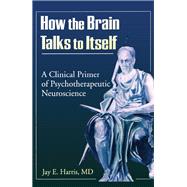- ISBN: 9780789004093 | 0789004097
- Cover: Nonspecific Binding
- Copyright: 3/24/1998
Now you can more fully understand and help your clients with this description of the development of the consciousness of identity as it occurs in well-defined stages. How the Brain Talks to Itself synthesizes recent discoveries in cognitive neuroscience with a psychoanalytic understanding of human dynamics and a working model for clinical diagnosis. In studying how the brain talks to itself to solve survival problems, this text looks at two sets of situations. In the first, neural possibilities mesh adaptively. In the second, dysfunction clouds the picture--something has gone wrong with the brain, in the life, or in a combination that ends in clinical syndromes. Unlike other books in this area that have narrow focuses, How the Brain Talks to Itself gives you an extensive and thorough exploration of the human condition by examining the effect that impairment of the left hemisphere has on goals and ambitions, problemsolving, the formation of syndromes, the use of transitional object transference in stabilizing patient identity, and how the brain registers, organizes, assesses, reflects, and acts on data. You'll find this information gives you a comprehensive framework for diagnosing and treating your patients. Chapters will further enhance your knowledge and help you improve your skills by: amplifying what we can learn from the conventional mental status exam prioritizing and targeting therapeutic interventions providing a framework for fitting advances in psychopharmacology into psychotherapy reconciling disparate forms of psychotherapy in the context of a neural-systems informed "structural therapy" How the Brain Talks to Itself combines vast domains of data so that higher cortical functions consistently relate to their corresponding identity functions. You'll explore the mechanisms that link synaptic potentiation to the emotionally and cognitively organized memories that sustain development. These mechanisms process the cognitive, social, and emotional data that are needed for problemsolving. You'll also see how the ways in which synaptic potentiations are comprised by definable varieties of stress that lead to the spectrum of DSM-IV syndromes. Author Jay E. Harris, MD, derives functional and structural principles from all of the disciplines--psychoanalytic psychology, cognitive neuroscience, clinical psychiatry, neurology, and linguistics--relevant to the brain's development, information processing, problemsolving, and syndrome formation. He includes case histories, clinical vignettes, and diagnostic examples of mental status dialogues with patients to help you in your understanding of this complex topic. You'll find that How the Brain Talks to Itself answers many questions you have about the brain's role in identity formation and resultant clinical sydromes.






